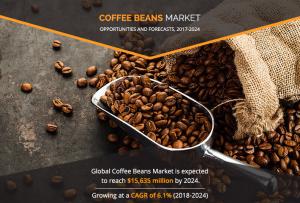
Coffee Beans Market
Global coffee beans market valued at $10.5 billion in 2017, expected to grow at a 6.1% CAGR to $15.6 billion by 2024, led by specialty coffee trends.
— Allied Market Research
WILMINGTON,NEW CASTLE, DELAWARE, UNITED STATES, July 20, 2024 /EINPresswire.com/ — According to a new report published by Allied Market Research titled, Coffee Beans Market by Product and End Use: Global Opportunity Analysis and Industry Forecast, 2017-2024,” the global coffee beans market size was valued at $10,471 million in 2017, and is expected to reach $15,635 million by 2024, registering a CAGR of 6.1% from 2018 to 2024. Europe dominated the global market, accounting for around one-third share of the total revenue.
📍𝐀𝐯𝐚𝐢𝐥𝐚𝐛𝐥𝐞 𝐒𝐚𝐦𝐩𝐥𝐞 𝐑𝐞𝐩𝐨𝐫𝐭 :
𝐄𝐱𝐜𝐢𝐭𝐢𝐧𝐠 𝐎𝐟𝐟𝐞𝐫 𝐀𝐥𝐞𝐫𝐭! 🚀 𝐆𝐞𝐭 𝐚 𝐌𝐚𝐬𝐬𝐢𝐯𝐞 𝐃𝐢𝐬𝐜𝐨𝐮𝐧𝐭 𝐨𝐧 𝐘𝐨𝐮𝐫 𝐍𝐞𝐱𝐭 𝐏𝐮𝐫𝐜𝐡𝐚𝐬𝐞! 𝐁𝐮𝐲 𝐧𝐨𝐰 𝐚𝐧𝐝 𝐭𝐚𝐤𝐞 𝐚𝐝𝐯𝐚𝐧𝐭𝐚𝐠𝐞 𝐨𝐟 𝐭𝐡𝐢𝐬 𝐥𝐢𝐦𝐢𝐭𝐞𝐝-𝐭𝐢𝐦𝐞 𝐨𝐟𝐟𝐞𝐫. 🛍️
The global coffee beans market is a dynamic and rapidly evolving sector driven by increasing consumption, diverse consumer preferences, and significant economic impact. Coffee is one of the most popular beverages worldwide, with its market intricately tied to various factors, including production methods, trade policies, and consumer trends. The demand for coffee beans continues to rise, fueled by the growing coffee culture, especially in urban areas, and the proliferation of specialty coffee shops.
One of the key drivers of the coffee beans market is the increasing consumer demand for high-quality, specialty coffee. Specialty coffee shops, artisanal roasters, and third-wave coffee movements have popularized premium coffee, emphasizing unique flavors, origins, and brewing methods. This trend has led to greater interest in single-origin beans, fair trade certifications, and organic coffee, driving growth in niche market segments. Consumers are willing to pay a premium for ethically sourced and sustainably produced coffee, benefiting farmers who adhere to these practices.
The market is segmented based on type, including Arabica, Robusta, and Liberica beans. Arabica beans, known for their smooth flavor and lower caffeine content, dominate the market, accounting for the majority of global coffee production. Robusta beans, which are more robust and have higher caffeine content, are also significant, particularly in instant coffee and espresso blends. While Liberica beans represent a smaller segment, they are valued for their unique taste and are gaining popularity in specific regions.
Geographically, the coffee beans market is led by regions such as North America, Europe, Asia-Pacific, and Latin America. Latin America, particularly Brazil and Colombia, is the largest producer of coffee beans, supplying a substantial portion of the global market. Brazil alone accounts for nearly 40% of global coffee production. Asia-Pacific, with countries like Vietnam and Indonesia, is also a major producer, especially of Robusta beans. North America and Europe are significant consumers, with the United States, Germany, and Italy being key markets due to their high coffee consumption rates and strong coffee cultures.
Technological advancements in coffee cultivation and processing are also influencing the market. Innovations such as precision agriculture, improved irrigation techniques, and pest-resistant coffee plant varieties are enhancing yield and quality. Processing methods like washed, natural, and honey processing are being optimized to bring out distinctive flavors and cater to diverse consumer preferences. Additionally, advancements in roasting and brewing technologies are allowing coffee producers and retailers to offer a wide range of products, from whole beans to ready-to-drink coffee beverages.
Sustainability and ethical sourcing are critical aspects of the coffee beans market. Consumers are increasingly aware of the environmental and social impact of their coffee consumption. As a result, there is growing demand for coffee that is certified organic, fair trade, or Rainforest Alliance-certified. These certifications ensure that coffee is produced in environmentally friendly ways and that farmers receive fair compensation, promoting sustainable livelihoods. Companies are investing in direct trade relationships, supporting farmers through education and resources to improve their practices and product quality.
Looking ahead, the coffee beans market is expected to continue its growth trajectory, driven by ongoing trends and emerging opportunities. The rise of e-commerce and direct-to-consumer sales channels is making it easier for consumers to access a wide variety of coffee beans from around the world. Cold brew and ready-to-drink coffee beverages are gaining popularity, especially among younger consumers looking for convenient and refreshing options. Additionally, the exploration of new markets and the increasing popularity of coffee in traditionally tea-drinking regions, such as parts of Asia, present significant growth opportunities.
💡𝐓𝐲𝐩𝐞𝐬 𝐨𝐟 𝐂𝐨𝐟𝐟𝐞𝐞 𝐁𝐞𝐚𝐧𝐬:
⦁ 𝐀𝐫𝐚𝐛𝐢𝐜𝐚 (𝐂𝐨𝐟𝐟𝐞𝐚 𝐚𝐫𝐚𝐛𝐢𝐜𝐚):
⦁ Grown at higher altitudes.
⦁ Known for its smooth, complex flavor and aromatic profile.
⦁ Contains less caffeine than Robusta.
⦁ More susceptible to pests and diseases.
⦁ Represents about 60-70% of global coffee production.
⦁ 𝐑𝐨𝐛𝐮𝐬𝐭𝐚 (𝐂𝐨𝐟𝐟𝐞𝐚 𝐜𝐚𝐧𝐞𝐩𝐡𝐨𝐫𝐚):
⦁ Grown at lower altitudes.
⦁ Known for its strong, bold flavor and higher caffeine content.
⦁ More resilient to pests and diseases.
⦁ Often used in espresso blends and instant coffee.
⦁ Represents about 30-40% of global coffee production.
💡𝐏𝐫𝐨𝐜𝐞𝐬𝐬𝐢𝐧𝐠 𝐌𝐞𝐭𝐡𝐨𝐝𝐬:
⦁ 𝐃𝐫𝐲 𝐏𝐫𝐨𝐜𝐞𝐬𝐬𝐢𝐧𝐠 (𝐍𝐚𝐭𝐮𝐫𝐚𝐥):
⦁ Coffee cherries are spread out in the sun to dry.
⦁ Beans are separated from the dried fruit.
⦁ Results in a fuller-bodied, fruitier flavor.
⦁ 𝐖𝐞𝐭 𝐏𝐫𝐨𝐜𝐞𝐬𝐬𝐢𝐧𝐠 (𝐖𝐚𝐬𝐡𝐞𝐝):
⦁ Coffee cherries are pulped to remove the outer skin.
⦁ Beans are fermented to remove the mucilage, then washed and dried.
⦁ Produces a cleaner, brighter flavor profile.
⦁ 𝐒𝐞𝐦𝐢-𝐖𝐚𝐬𝐡𝐞𝐝 𝐏𝐫𝐨𝐜𝐞𝐬𝐬𝐢𝐧𝐠:
⦁ Combines elements of both dry and wet processing.
⦁ Cherries are pulped, but some mucilage is left on during drying.
⦁ Results in a balanced flavor with some body and brightness.
💡 𝐑𝐨𝐚𝐬𝐭𝐢𝐧𝐠 𝐋𝐞𝐯𝐞𝐥𝐬:
⦁ 𝐋𝐢𝐠𝐡𝐭 𝐑𝐨𝐚𝐬𝐭:
⦁ Light brown in color, no oil on the surface.
⦁ Retains most of the original flavors of the bean.
⦁ Higher acidity, lighter body.
⦁ 𝐌𝐞𝐝𝐢𝐮𝐦 𝐑𝐨𝐚𝐬𝐭:
⦁ Medium brown color, balanced flavor.
⦁ Some oil may be present on the surface.
⦁ Balanced acidity and body.
⦁ 𝐃𝐚𝐫𝐤 𝐑𝐨𝐚𝐬𝐭:
⦁ Dark brown to almost black, with an oily surface.
⦁ Stronger, more pronounced roast flavor.
⦁ Lower acidity, heavier body.
💡 𝐇𝐞𝐚𝐥𝐭𝐡 𝐁𝐞𝐧𝐞𝐟𝐢𝐭𝐬 𝐨𝐟 𝐂𝐨𝐟𝐟𝐞𝐞:
⦁ 𝐑𝐢𝐜𝐡 𝐢𝐧 𝐀𝐧𝐭𝐢𝐨𝐱𝐢𝐝𝐚𝐧𝐭𝐬:
Contains antioxidants that help combat free radicals in the body.
⦁ 𝐈𝐦𝐩𝐫𝐨𝐯𝐞𝐝 𝐂𝐨𝐠𝐧𝐢𝐭𝐢𝐯𝐞 𝐅𝐮𝐧𝐜𝐭𝐢𝐨𝐧:
Caffeine can enhance alertness, concentration, and cognitive function.
⦁ 𝐑𝐞𝐝𝐮𝐜𝐞𝐝 𝐑𝐢𝐬𝐤 𝐨𝐟 𝐂𝐞𝐫𝐭𝐚𝐢𝐧 𝐃𝐢𝐬𝐞𝐚𝐬𝐞𝐬:
Studies suggest that coffee consumption may lower the risk of diseases like Parkinson’s, Alzheimer’s, type 2 diabetes, and certain types of cancer.
⦁ 𝐄𝐧𝐡𝐚𝐧𝐜𝐞𝐝 𝐏𝐡𝐲𝐬𝐢𝐜𝐚𝐥 𝐏𝐞𝐫𝐟𝐨𝐫𝐦𝐚𝐧𝐜𝐞:
Caffeine increases adrenaline levels, which can improve physical performance.
📍𝐈𝐧𝐭𝐞𝐫𝐞𝐬𝐭𝐞𝐝 𝐭𝐨 𝐏𝐫𝐨𝐜𝐮𝐫𝐞 𝐭𝐡𝐞 𝐃𝐚𝐭𝐚 𝐈𝐧𝐪𝐮𝐢𝐫𝐞 :
💡 𝐌𝐚𝐫𝐤𝐞𝐭 𝐓𝐫𝐞𝐧𝐝𝐬:
⦁ 𝐒𝐩𝐞𝐜𝐢𝐚𝐥𝐭𝐲 𝐂𝐨𝐟𝐟𝐞𝐞:
Increasing demand for high-quality, single-origin coffee with unique flavor profiles.
⦁ 𝐒𝐮𝐬𝐭𝐚𝐢𝐧𝐚𝐛𝐢𝐥𝐢𝐭𝐲 𝐚𝐧𝐝 𝐄𝐭𝐡𝐢𝐜𝐚𝐥 𝐒𝐨𝐮𝐫𝐜𝐢𝐧𝐠:
Growing consumer preference for ethically sourced and sustainably grown coffee. Certifications like Fair Trade, Rainforest Alliance, and Organic are becoming more important.
⦁ 𝐂𝐨𝐧𝐯𝐞𝐧𝐢𝐞𝐧𝐜𝐞 𝐏𝐫𝐨𝐝𝐮𝐜𝐭𝐬:
Rise in popularity of convenient coffee products such as single-serve pods, cold brew, and ready-to-drink coffee beverages.
⦁ 𝐓𝐞𝐜𝐡𝐧𝐨𝐥𝐨𝐠𝐢𝐜𝐚𝐥 𝐈𝐧𝐧𝐨𝐯𝐚𝐭𝐢𝐨𝐧𝐬:
Advances in brewing technology, such as smart coffee makers and precision grinders, are enhancing the coffee experience.
⦁ 𝐇𝐞𝐚𝐥𝐭𝐡-𝐂𝐨𝐧𝐬𝐜𝐢𝐨𝐮𝐬 𝐂𝐨𝐧𝐬𝐮𝐦𝐩𝐭𝐢𝐨𝐧:
Increased interest in health benefits and functional coffee products, including those with added nutrients or adaptogens.
💡 𝐂𝐡𝐚𝐥𝐥𝐞𝐧𝐠𝐞𝐬:
⦁ 𝐂𝐥𝐢𝐦𝐚𝐭𝐞 𝐂𝐡𝐚𝐧𝐠𝐞:
Affects coffee-growing regions, impacting yield and quality. Higher temperatures and changing weather patterns can lead to increased pest and disease outbreaks.
⦁ 𝐏𝐫𝐢𝐜𝐞 𝐕𝐨𝐥𝐚𝐭𝐢𝐥𝐢𝐭𝐲:
Coffee prices are subject to fluctuations due to factors like weather conditions, geopolitical issues, and market speculation.
⦁ 𝐋𝐚𝐛𝐨𝐫 𝐏𝐫𝐚𝐜𝐭𝐢𝐜𝐞𝐬:
Addressing fair wages and working conditions for coffee farmers is an ongoing concern.
Coffee beans are a crucial commodity with a rich history and significant cultural importance worldwide. The industry continues to evolve, driven by consumer preferences for quality, sustainability, and convenience. Addressing challenges such as climate change and ethical sourcing is vital for the future of coffee production. If you have any specific questions or need more detailed information, feel free to ask!
The usage of coffee beans in pharmaceutical industry is augmenting the global coffee beans market. The health-benefits associated with coffee beans in form of dietary supplements has given rise to its consumption. Green coffee beans extracts have a higher level of chlorogenic acid as compared to other roasted and regular coffee beans because green coffee beans are not roasted. Thus, the adoption of green coffee beans in form of weight loss supplements has been widely observed among consumers.
The European consumers prefer high-value specialty coffee that offer a unique experience and are knowledgeable about coffee varieties. In addition, increase in health consciousness of the young population boosts the adoption of black coffee, which drives the market growth. This further offers opportunities for coffee beans suppliers to provide unique blends, flavors, and ready-to-drink coffee.
LAMEA is one of the emerging regions in terms of coffee consumption, as Brazil, South Africa, Saudi Arabia, and Turkey offer potential opportunities for the coffee beans market. New product offerings and flavor differentiation are the key strategies adopted by manufacturers to increase their market share. Furthermore, manufactures have introduced promotional pricing strategies to increase their sales. Moreover, introduction of appealing packaging and new flavors combined with campaigns through social events and networks a fuel the growth of the market.
📍𝐌𝐚𝐤𝐞 𝐚 𝐃𝐢𝐫𝐞𝐜𝐭 𝐏𝐮𝐫𝐜𝐡𝐚𝐬𝐞 :
The impact of competitive rivalry in the global coffee beans market is moderate because of large number of players, moderate strategies adopted by operating companies, high innovation pursued, and higher growth rate in the global market. Major players in the global coffee beans market are focusing on new product development to gain a strong foothold in the market.
« » 𝐊𝐞𝐲 𝐅𝐢𝐧𝐝𝐢𝐧𝐠𝐬 𝐨𝐟 𝐭𝐡𝐞 𝐂𝐨𝐟𝐟𝐞𝐞 𝐁𝐞𝐚𝐧𝐬 𝐌𝐚𝐫𝐤𝐞𝐭:
💡In terms of value, the arabica caf beans generated the maximum revenue in 2017 and is expected to grow at a CAGR of 5.5% during the forecast period.
💡The pharmaceutical industry is likely to grow at the fastest rate at a CAGR of 6.9% by 2024.
💡Europe is expected to dominate the market, registering the CAGR of 5.4% in terms of value.
💡Asia-Pacific is projected to show exponential growth in demand throughout 2024, growing at a CAGR 7.6% of in terms of value.
💡India and China are expected to witness considerably high growth rates at a CAGR of 10.9% and 9.0% respectively, during the forecast period.
𝐀𝐛𝐨𝐮𝐭 𝐔𝐬
Allied Market Research (AMR) is a full-service market research and business-consulting wing of Allied Analytics LLP based in Portland, Oregon. Allied Market Research provides global enterprises as well as medium and small businesses with unmatched quality of “Market Research Reports” and “Business Intelligence Solutions.” AMR has a targeted view to provide business insights and consulting to assist its clients to make strategic business decisions and achieve sustainable growth in their respective market domain.
Pawan Kumar, the CEO of Allied Market Research, is leading the organization toward providing high-quality data and insights. We are in professional corporate relations with various companies and this helps us in digging out market data that helps us generate accurate research data tables and confirms utmost accuracy in our market forecasting. Each and every data presented in the reports published by us is extracted through primary interviews with top officials from leading companies of domain concerned. Our secondary data procurement methodology includes deep online and offline research and discussion with knowledgeable professionals and analysts in the industry.
David Correa
Allied Market Research
+1 800-792-5285
email us here
Visit us on social media:
Facebook
X
![]()
Article originally published on www.einpresswire.com as Coffee Beans Market to Reach $15.6 Billion by 2024, Driven by Specialty Coffee Demand




